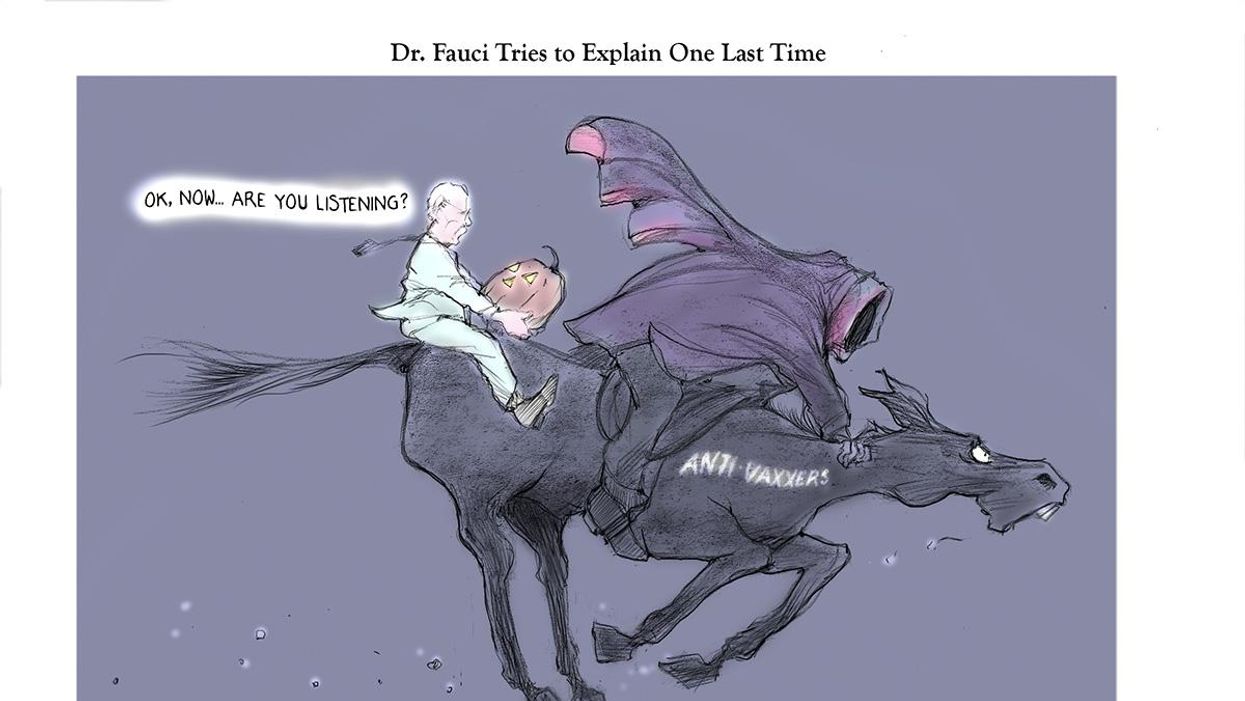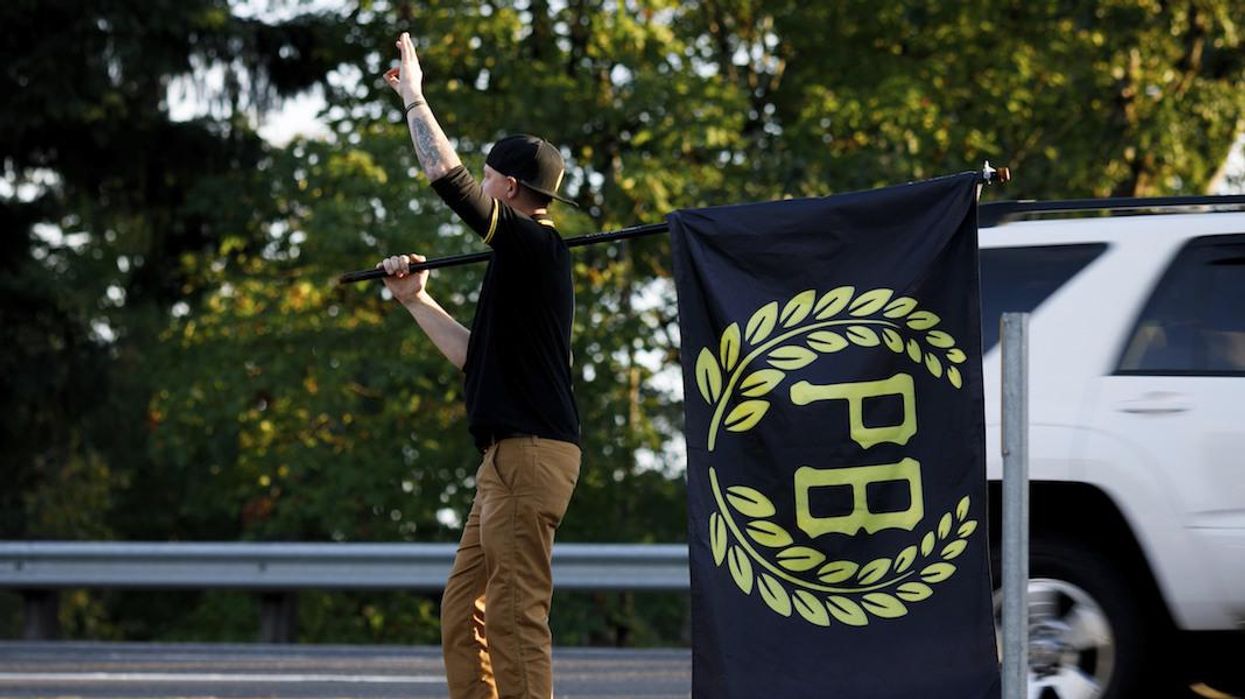Going into that first meeting, MacKenzie, who chairs the Orange County School Board, worried some parents would be angry about mask mandates and other policies the board had implemented to help protect the community from COVID. But when she spotted two men in Proud Boys apparel in the crowd, she realized something more insidious was at play.
"One wore a stocking over his face, which completely obscured his entire face for the whole meeting," MacKenzie recently told a local radio station. "The other one told our board during public comment that someone should tie rocks around our necks and we should throw ourselves in a river."
A "knife and a spear" were also confiscated from people at a school board meeting, MacKenzie told the American Independent Foundation in a phone interview.
"That was the first time it felt threatening," she said.
Since that first meeting on September 13, MacKenzie and her school board colleagues have experienced what she describes as a full-on harassment campaign. What started as a contingent of concerned, vocal parents has since devolved, with members of the violent white supremacist extremist group the Proud Boys showing up to board meetings in growing numbers.
"I didn't know that I was going to have to get a home security system because of serving on the local school board," MacKenzie said. "It's just a sad statement to the environment that we're working in right now."
The situation in Orange County is not unique. In recent months, instances of violence and harassment from extremist groups have spiked. Proud Boys members have teamed up with anti-maskers to protest school board meetings across the country, harassing board members over COVID safety protocols.
School officials are quitting or retiring early in droves in response to the vitriol, threats, intimidation, and harassment they are experiencing at their jobs.
It's all part of a larger trend that domestic terror experts have, for months, been warning about: Extremism could get worse as the country grapples with the pandemic. These recent trends have some researchers concerned that once-fringe ideas related to vaccine misinformation and anti-government sentiment have become mainstreamed, the implications of which could last for years.
"The pandemic has amplified the rate at which people are joining these domestic extremist organizations," said Kesa White, the co-director of the Crisis Communication, Polarization and Extremism Research and Innovation Lab at American University. "And it's impacting the ideology in which they're believing in at the moment, because these groups are able to exploit the pandemic to be about being one thing, then manipulating people into thinking it's another thing."
Why anti-vaccine violence can't be contained
Violence tied to pandemic restrictions transcends geographical, political, and social boundaries. It impacts small towns and big cities, red states and blue ones. And it's not going away anytime soon.
In recent months, activists angered by COVID restrictions have targeted doctors in Helena, Montana; threatened school board members in Brevard, Florida; harassed pharmacists in Springfield, Missouri; and even killed a grocery store worker in Atlanta, Georgia.
On October 6, a group of anti-vaccine protesters in Beverly Hills, California, heckled a group of children and their parents as they were walking to school. Shiva Bagheri — a well-known vaccine skeptic who allegedly punched a breast cancer patient over a mask dispute earlier this year — was caught on camera screaming at the school kids.
"This is rape. They're trying to rape our children with this poison," Bagheri can be heard saying. "They're going to rape their lives away."
"I would hope that no matter what your view really is on any issue — and in this case it happens to be the vaccine and the mask issue — you wouldn't harass kids about it," Beverly Hills Mayor Robert Wunderlich, who was present outside the school and also targeted by the demonstrators, told the American Independent Foundation. "I think it was horrific, the way that the kids and the parents were harassed. I also don't think it would be particularly effective if you legitimately want to communicate a viewpoint."
Wunderlich, who before seeking public office worked as an industry scientist and holds a Ph.D. in chemical physics from Harvard, said he tried to engage with the anti-vaccine protesters, inviting them back to his office to discuss their views in a more acceptable setting. He didn't find that they were particularly interested in thoughtful discussion, however.
"I listened to them. I told them a variety of things," Wunderlich recalled of their conversation later that day. "They cited what they felt were some statistics that would support their case. We didn't really go there in that conversation."
In September, the National School Board Association president sent a letter to President Biden asking for security help given the rise in violence. The group has since apologized for sending the letter, which was not fully approved by the entire group before being sent.
Though MacKenzie said she's experienced increasingly concerning threats and harassment in Orange County, what she's most worried about is the effect all this is having on students and school staff.
"It's not about my political viewpoint or how I feel about it," MacKenzie said. "The reason I serve in this role is because I care about the students and the staff members in this school district. And we have spent a good amount of time talking to staff members and students about how this situation is affecting them."
Extremist groups are even using the protests at school board meetings as an opportunity to recruit new members, experts say. White is concerned about the lasting implications of this moment. The biggest problem, she said, is that by allowing groups like the Proud Boys to show up regularly at public forums, extremist organizations can push their fringe ideologies into the mainstream.
"Those students are the next generation, so the Proud Boys and all these other organizations are essentially trying to groom the next group of recruits," White said. "The scary part is that they're putting themselves out there in the public light to show that, 'We're not just this scary movement that does all these terrible things the media says. We're actually a good group of guys as you can see from just talking to us.'"
At one of the Orange County school board meetings where the Proud Boys showed up, MacKenzie recalled a moment that still gives her chills. At the end of the meeting, she said, she saw a man wearing Proud Boys gear introducing himself to a student.
"Of all the things that I saw — and there was lots of hateful rhetoric — that was the moment that just kind of broke my heart because I don't know what else recruitment would look like," she said.
From the fringe to the mainstream
Violence tied to anti-public health sentiments is nothing new for Dr. Richard Pan, a pediatrician and California state senator.
For nearly a decade, anti-vaccine activists in California have vilified Pan for advocating for vaccine requirements in the state. In 2015, Pan authored a bill limiting exemptions to school immunization requirements by requiring a legitimate medical excuse rather than exemption based merely on "personal beliefs." Before the bill was signed into law, it faced vehement opposition from anti-vaccine activists; one witness testified in the statehouse that she believed vaccination was akin to rape.
When Pan authored another bill in 2019 to tamp down on fraudulent medical exemptions to vaccines amid a major measles outbreak, anti-vaccine aggressors ramped up their opposition. They distributed posters that showed Pan's face covered in blood. They assaulted him on the street, pushing and shoving him while streaming the altercation live on Facebook. One woman doused human blood on the California Senate floor.
"Obviously it was a direct threat to my safety, and my life," Pan told the American Independent Foundation. "That's what they were there for. They were there for blood. They were there to inflict harm on me."
Officials seeking to curb extremist violence have few good options. At the local level, cities and states have enacted new limitations on protests near schools and vaccination sites; in California, a new law authored by Pan makes it illegal to "obstruct, intimidate, or harass" individuals on their way to get vaccinated.
The California law echos similar laws that prohibit anti-abortion protesters from intimidating people outside women's health clinics, or electioneering laws that ban political activity within a certain radius of polling places. But opponents of the California law have criticized the measure as an unconstitutional limitation on First Amendment rights.
While the pandemic has accelerated anti-public health violence, Pan pointed to another key culprit in stoking radicalization in the COVID era: social media.
"Social media isn't necessarily the match, but it's the gasoline," he said.
Published with permission of The American Independent Foundation.










